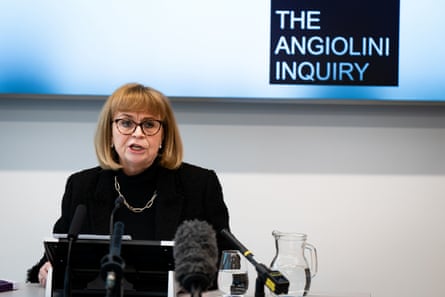Male police officers accused of domestic abuse were promoted into positions tackling rape and violence against women, rather than being punished, according to a new report.
The report from the Centre for Women’s Justice is based on the testimony of more than 200 women who allege attacks by their police officer partners. It concludes that, despite promises from police chiefs of change, little progress has been made and failings are “systemic”.
Almost half of the women were police employees, with the vast majority reporting incidents and failings in the last four years.
One victim’s alleged abuser was promoted to the rank of chief inspector, despite having two separate rape allegations against him from two women.
Another male officer with two separate allegations from two women was later placed in his force’s anti-corruption department.
In another case it is alleged that an abuser helps lead his force’s efforts protecting women against violence. His victim, who was also a police officer, was placed on “compassionate leave” while her alleged attacker continued to work. She has now left that force.
The report from the CWJ follows its super complaint four years ago. It says little has changed, despite a flurry of initiatives.
The report says: “There is still ample evidence to show that there are still far too many police officers escaping sanction, despite multiple allegations of abuse, with some rising through the ranks and even promoted to roles with responsibility for policing rape and domestic abuse.
“Forty-five per cent of the women who came forward are themselves police officers or staff and frequently report victimisation if they dare to report a fellow officer.”
Police chiefs vowed to change after the super complaint and the pressure intensified after a series of revelations that police failings left two officers free to attack women with catastrophic consequences.
The Angiolini inquiry found that Wayne Couzens should never have been a police officer but vetting failures and the bungling of sex attack claims against him led him to be an elite Metropolitan police officer entrusted with a gun. He kidnapped and murdered Sarah Everard in March 2021.

David Carrick survived in the Met despite multiple complaints against him, before being convicted of 85 serious offences including 48 rapes.
The CWJ report says the police are still failing victims: “They are still having to battle against a lack of independence in investigations, minimisation of offending behaviour by investigating officers, a disproportionate response to counter-allegations, failures to pursue misconduct investigations and poor data collection, so connections are not made, even where there are multiple allegations.”
The report includes harrowing case studies. One woman, only named as “Suzanne”, a serving police officer, said that she and her ex-husband’s subsequent wife made allegations of domestic abuse against him but no action was taken. The male officer “continues to work in a frontline role which brings him into contact with vulnerable victim/survivors”, the report says.
The Met police, the largest force in the UK, faced 16 allegations in the report, the most of the 43 forces in England and Wales. Devon and Cornwall faced 15 allegations and is being sued for failings by women – including those who served in its ranks.
The CWJ found men used the system to take revenge against those they allegedly attacked.
“Farah” (not her real name) reported her police officer partner for attacking her and photographed her injuries. Officers from the same station where her partner worked investigated, and no action was taken.
The report says: “Three days after doing so, she was arrested on counter-allegations of harassment. She was 20 weeks pregnant at the time and was detained in a police cell for an entire day.
“She was subsequently released on bail, but was required to return for questioning on three separate occasions. The third occasion was just three days after she had given birth … The case against her was only discontinued when the CPS became involved.”
Farah was also accused of contacting her alleged attacker in breach of her bail conditions, when she called 101 to leave a message that she had given birth to their child.
The report says police chiefs are formulating plans without the experience of victims being at the centre of shaping them.
Harriet Wistrich of the CWJ said: “The stories we are seeing are alarming and we are yet to see the transformation taking place, despite the initiatives and announcements that have been made.”
Maggie Blyth, a deputy chief constable and deputy CEO at the College of Policing, said: “We know change hasn’t been quick enough, and much more needs to be done to ensure women and girls feel safe.
“We have made improvements to root out those who are not fit to wear the uniform, and ensure our workforce upholds our code of ethics and meets the very highest standards. We will ensure criminal and misconduct investigations are carried out impartially, and it is crucial we listen, support, and adopt a victim-first approach.”
Source: theguardian.com


















